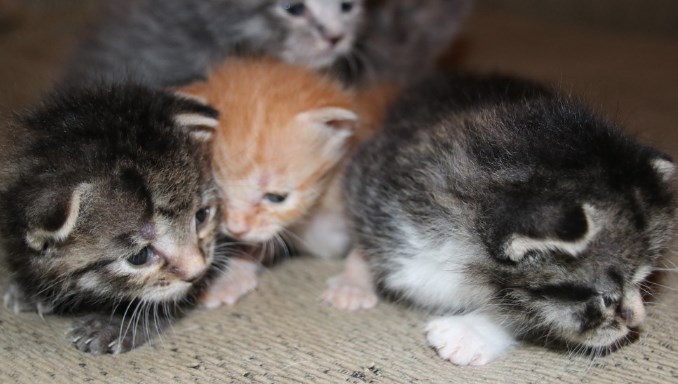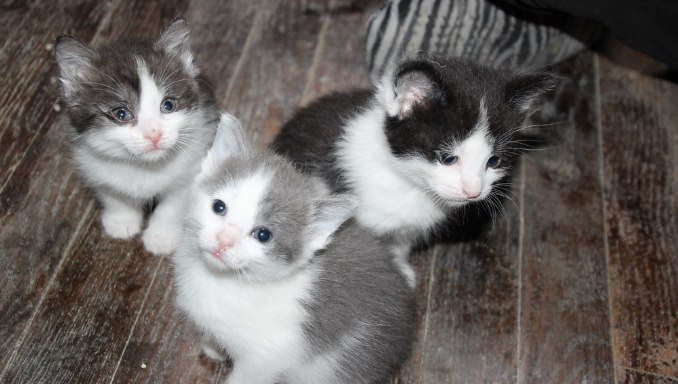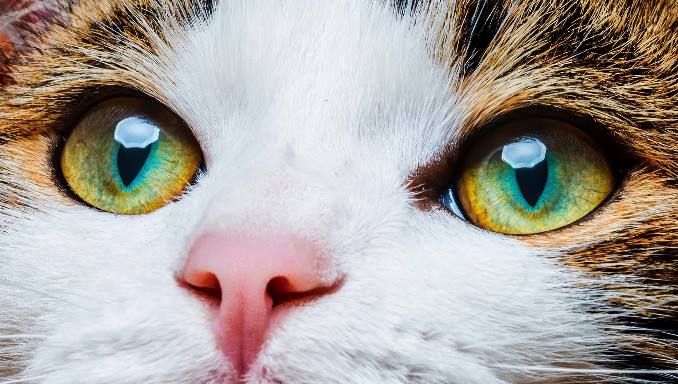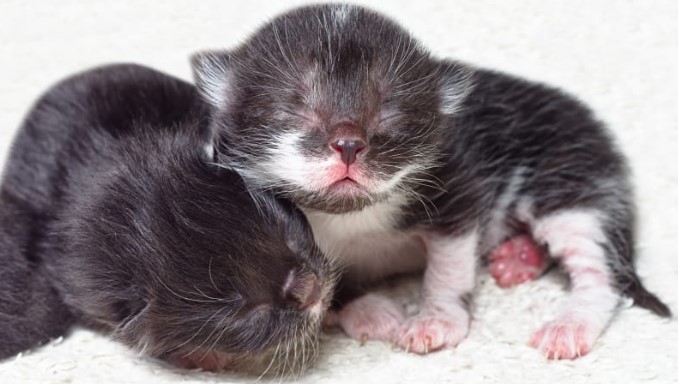When Do Kittens Open Their Eyes?
Newborn kittens are some of the most adorable creatures on the planet. But did you know that they aren’t born able to see or hear? In fact, their eyes and ears are still developing during the first few weeks of life. Kittens are also born without any fur. During the first few weeks of life, they will grow a thick coat of fur. And, by the time they are around eight weeks old, they will have reached their full adult size.
It’s a question that has fascinated cat owners for years: When do kittens open their eyes? Some people say it’s within a day or two of being born, while others maintain that it takes weeks. So what’s the truth? To find out, we did some research. Here’s what we discovered.

One difference between cat’s vision and ours is that cats can see ultraviolet light while humans cannot. This means that cats can see things that we cannot. This may be one of the reasons why cats are attracted to shiny objects. Another difference is that cat’s pupils can open much wider than ours, which gives them better night vision. Cats also have a third eyelid, or nictitating membrane, which helps protect their eyes and keeps them moist.
But most kittens are born with their eyes shut. They will begin to open them a few days after birth. However, it may take up to two weeks for their eyes to be fully open. During this time, their vision is not yet fully developed. It can take up to eight weeks for a kitten’s vision to fully develop.
As for hearing, kittens are born with their ear canals closed. This is to protect them from infection while their immune system is still developing. The ear canals will begin to open at around two weeks of age. It can take up to four weeks for a kitten’s hearing to fully develop.
But that’s not all, to dig deeper into the question “When do kittens open their eyes?” and other related issues, you should refer to our article below. Keep reading for more information!
See more: When Do Kittens Start Walking? How To Help Them – Vet Ranch
When Do Kittens Open Their Eyes? – Eye Development in Cats
Most kittens open their eyes for the first time between seven and ten days old. Some kittens may open their eyes a bit earlier or a bit later than this range, but seven to ten days is pretty typical. Cats are born with their eyes closed and don’t open them until they are about 10 days old. Once their eyes open, they spend the next few weeks refining their vision.
Kittens’ eyes continue to develop throughout their first year of life. By the time they are adults, their vision is similar to that of humans.
If your kitten’s eyes are still closed after two weeks, though, it’s time to talk to your veterinarian. There can be several reasons why a kitten’s eyes haven’t opened yet, and it’s always best to get professional advice to make sure everything is on track.
If your kitten’s eyes are open but don’t seem to be focusing well, or if the eyelids look red and irritated, those are also signs that it’s time for a trip to the vet. In most cases, though, once those little eyes open up, they’re here to stay!
When do kittens eyes change color?
Kittens’ eyes change color as they grow and develop. The process begins around 6 to 8 weeks of age, when their eyes start to lighten in color. By 12 weeks old, most kittens’ eyes have reached their final color. However, some cats’ eyes may continue to change color slightly throughout their lives. For example, a cat’s eyes may become brighter in color during times of excitement or stress.

Eye Infection in Newborn Cats – Causes, Symptoms and Treatments
Newborn kittens are especially susceptible to eye infections because their immune systems are not yet fully developed. The most common cause of eye infections in newborn kittens is bacteria that enter the eye through the tear ducts. Other causes include viral infections, allergies, and foreign bodies such as dirt or sand.
Symptoms of an eye infection in a newborn kitten include red, watery eyes, discharge from the eyes, and crusting around the eyes. The kitten may also rub its eyes or hold them closed. If the infection is severe, the kitten may have difficulty breathing and may need to be hospitalized.
Treatment for an eye infection in a newborn kitten will vary depending on the cause. Bacterial infections are treated with antibiotics, while viral infections are treated with antiviral medications. Allergies and foreign bodies can often be treated at home. If the infection is severe, however, the kitten may need to be hospitalized for intensive treatment.
How to Keep Kitten’s Eyes Healthy
As a kitten owner, you will want to take special care of your kitten’s eyes. Kittens are born with their eyes closed, and they will not open for about 10 days. Once they open, you will need to clean them daily with a soft, damp cloth. Be very careful not to get water or soap in the kitten’s eyes.
You will also need to keep an eye out for any discharge from the kitten’s eyes. If you see any, it is important to take the kitten to the vet right away as this could be a sign of an infection.
Kittens are also prone to developing tear stains. These are dark stains that can form under the kitten’s eyes. They are caused by the kitten’s tears draining into their fur. Tear stains can be cleaned with a soft, damp cloth. If they do not go away, you may need to take your kitten to the vet to have them professionally removed.
Kitten’s eyes are delicate and need special care to stay healthy. Here are some tips on how to keep your kitten’s eyes healthy:
1. Avoid exposing your kitten to cigarette smoke, dust, or other irritants.
2. Keep your kitten’s bedding clean and free of debris.
3. Gently wipe away any discharge from your kitten’s eyes with a clean, damp cloth.
4. Take your kitten to the vet for regular checkups and eye examinations.
5. If you notice any changes in your kitten’s eyes, such as redness, swelling, or discharge, contact your vet immediately.
By following these tips, you can help ensure that your kitten has healthy eyes for life.
Information You May Not Know about Cat Eyes
Did you know that cats have a third eyelid? This membrane is called the nictitating membrane and it’s purpose is to protect the eye.
Cats are highly visual creatures and have excellent vision. They can see in near darkness and have a very wide field of view. Cats also have very good depth perception and can judge distances accurately.
While cats have very good vision, they don’t see color, as well as humans, do. Cats can see some colors, but not all of them. And, cats don’t see colors as vividly as humans do.
However, cats make up for their lack of color vision with their ability to see in low light conditions. Cats have a Tapetum Lucidum, which is a reflective layer of tissue in the back of the eye that helps to amplify light. This is what gives cats their “night vision.”
In addition to having good vision, cats also have very sharp hearing. Cats can hear sounds that are too high-pitched for humans to hear. And, they can also use their sense of smell to help them find their way around.
While cats have many different ways to perceive their surroundings, they primarily rely on their vision to help them navigate. So, if you think your cat isn’t paying attention to you, it’s probably because they’re trying to figure out what you’re doing by watching your every move!

Other Things to Know About Newborn Kittens
Kittens are born without Immunity
This means that they are not able to fight off infection and disease like adult cats can. This is why it is so important to make sure that your kitten stays up to date on their vaccinations. Without them, your kitten could very easily become sick and even die from something that an adult cat would be able to shrug off.
Kittens Need to Eat A Lot
A kitten’s stomach is only about the size of a marble when they are born. This means that they need to eat small meals often throughout the day in order to stay nourished. If you have a kitten, you will need to feed them every two to three hours.
Kittens Need a Lot of Sleep
Newborn kittens can sleep up to 20 hours a day! This is because they are growing so quickly and their little bodies need a lot of rest. As they get older, they will sleep less, but will still need more sleep than an adult cat.
Kittens are Born Blind and Deaf
Kittens are born without the ability to see or hear. However, their sense of smell is fully developed. This is why they are often seen sniffing around after they are born. Their eyes and ears will start to open around two weeks of age.
When Do Kittens Start Pooping?
Most kittens will start to poop on their own around 3-4 weeks of age. However, some may take a little longer to develop this skill. If your kitten hasn’t started pooping on their own by 6 weeks of age, you should consult with your veterinarian. Kittens usually learn how to use the litter box from their mothers, so if you have orphaned kittens, you may need to give them a little extra help in this department.
Keep in mind that it is normal for kittens to poop more frequently than adult cats. They may go several times a day at first, but their stools should gradually become firmer and less frequent as they mature. If you notice that your kitten is having difficulty passing stool, or if their stools are watery or bloody, please contact your veterinarian right away.
With a little patience and proper litter box training, your kitten will be pooping like a pro in no time!
When Can Kittens Eat Dry Food?
Kittens can start eating dry food as early as 6-8 weeks of age, but it’s best to introduce it gradually. Start by mixing a small amount of dry food with wet food or kitten formula, and slowly increase the amount of dry food over time. Offer dry food at room temperature or warmer; cold food may harden and be difficult for kittens to eat. Kittens should have access to dry food at all times, and you should see a gradual transition from wet to dry food over time. Consult your veterinarian if you have any concerns about your kitten’s diet.
Kittens need to eat more frequently than adult cats. They should have access to food at all times and you may need to feed them 3-4 times a day. Once they reach adulthood, they can be transitioned to twice a day feedings.
Dry food is an important part of a kitten’s diet as it provides them with the nutrients they need for proper growth and development. It’s important to choose a high-quality dry food that is specifically designed for kittens. Avoid generic or adult-specific foods as these can be lacking in the nutrients kittens need.
When switching your kitten to dry food, do so gradually over the course of a week or two. Mix the dry food with their current wet food until they are eating mostly dry food. This will help them adjust to the new food and avoid any stomach upset.
If you have any questions about when or how to transition your kitten to dry food, talk to your veterinarian. They can offer guidance and support to ensure that your kitten stays healthy and happy.
When can kittens eat wet food?
Kittens can eat wet food as soon as they are weaned from their mother’s milk. This is typically around 3-4 weeks of age. Kittens should have access to both dry and wet food at this point, and you can start slowly transitioning them to eating more wet food as they get older. By 8-10 weeks of age, most kittens will be eating mostly wet food.

Kittens: Pleasant and Unpleasant Things
Pleasant Things
There are many reasons why cats are considered cute creatures. One reason is their physical appearance. Cats have soft, furry bodies and typically have facial features that humans find appealing, such as big eyes and whiskers. Another reason why cats are considered cute is because of their behavior. Cats are often playful and curious, which can be endearing to people. Additionally, cats have a tendency to purr when they are happy or content, which can also be seen as cute.
But one of the most endearing qualities of cats is their independence. Unlike dogs, who rely on humans for everything from food and shelter to walks and playtime, cats are perfectly content to fend for themselves. This independent streak makes them seem more like furry little people than pets, and it’s one of the things that makes them so special.
Ultimately, the cuteness of cats is subjective, but there are definitely some characteristics that make them appealing to many people.
Unpleasant Things
Kittens are perhaps one of the most beloved creatures on the internet- but they’re not always as cute and cuddly as they seem. In fact, kittens can be downright unpleasant creatures.
For starters, kittens are known for their love of biting. Those sharp little teeth can do a lot of damage, especially if you’re not expecting it. Kittens also like to scratch, which can be very painful if you’re not careful.
But perhaps the most unpleasant thing about kittens is their habit of pooping everywhere. It doesn’t matter if you have a litter box- chances are, your kitten will still find a way to make a mess. And cleaning up after a kitten can be a real nightmare.
Kittens Have Sharp Claws
All kittens have sharp claws. However, the ones on the front paws are particularly sharp and can be used for self-defense or for climbing. It is important to keep your kitten’s nails trimmed so that they do not scratch you or damage your furniture.
Kittens are Adorable but Also Annoying
There is no denying that kittens are absolutely adorable. However, they can also be quite annoying. Kittens are very curious and like to explore everything. This can often lead to them getting into things they’re not supposed to and making a mess. They also like to play games at all hours of the night, which can be quite frustrating for their owners. Nonetheless, most people who have kittens would not trade them for anything in the world.
Kittens Grow Up to Be Cats
One day, your kitten will grow up to be a cat. This is an important thing to remember when you are considering getting a kitten. Cats are not as low-maintenance as people often think they are. They require a lot of care and attention, and they can live for over 20 years. So, if you’re not ready for that kind of commitment, a kitten may not be the right pet for you.
So, if you’re thinking about getting a kitten, be prepared for some unpleasantness. But also be prepared for lots of love and laughter. After all, kittens are still one of the most popular pets for a reason. They may be unpleasaant, but they’re also incredibly cute and lovable.
https://www.youtube.com/watch?v=gpzBmgGsCa8
FAQs
When do kittens start eating food and drinking water?
Kittens start eating food and drinking water when they are around four weeks old. At this age, they are able to digest solid food and absorb the nutrients they need from it. Kittens should always have access to fresh, clean water. You can encourage your kitten to drink more water by adding a little bit of chicken broth or tuna juice to their bowl.
When can kittens leave their mom?
Kittens can leave their mother at around 8 weeks old. This is when they are typically ready to wean and start eating solid food on their own. They will also be old enough to start using the litter box and exploring their new environment. It is important to make sure that they are comfortable and have all the necessary supplies before letting them go.
When do kittens calm down?
There is no one answer to this question, as every kitten is different and will calm down at their own pace. However, typically, kittens will start to calm down around the age of six months when they reach adulthood. Some tips to help encourage your kitten to calm down may include providing them with plenty of toys and playtime, as well as having a quiet place for them to retreat to when they need some downtime. Ultimately, it is important to be patient with your kitten and understand that they are still learning how to adjust to the world around them.
When do female cats go into heat?
Female cats usually go into heat during the spring and summer months. However, they can go into heat any time of year. The average length of a heat cycle is about two weeks. During this time, the female cat will be more vocal than usual, and she may urinate more frequently. She will also be attracted to male cats and may try to escape the house in search of a mate. If you want to prevent your female cat from getting pregnant, it is important to keep her indoors during her heat cycle. You should also consult with your veterinarian about using a high-quality pet food that contains nutrients that help support the health of the reproductive system.
When are kittens weaned?
Kittens are typically weaned by around eight weeks of age. However, some kitten may need to be weaned earlier if they are not receiving enough milk from their mother. If you are unsure when your kitten should be weaned, talk to your veterinarian for guidance.
When can kittens go outside?
Kittens can go outside as soon as they are vaccinated. This is typically around 8 weeks of age. Kittens should be kept indoors until they are at least 4 months old, as this is when they are fully vaccinated. kittens should also be kept indoors if there are any unvaccinated animals in the house. Also, make sure that they have a collar and ID tags. You may also want to consider microchipping your kitten. If you are unsure whether or not your kitten is ready to go outside, speak to your veterinarian.
Why is my kitten meowing so much?
Your kitten may be meowing more than usual for a variety of reasons. Some common reasons include hunger, boredom, attention-seeking, or stress. If your kitten seems to be meowing excessively, you should observe their behavior and try to identify any potential causes. Once you have determined the reason for their increased vocalization, you can take steps to address the issue. For example, if your kitten is meowing because they are bored, you can provide them with more toys and playtime. If your kitten is meowing due to stress, you may need to help them feel more comfortable and secure in their environment. Ultimately, if your kitten’s meowing becomes excessive or bothersome, you should consult with a veterinarian to rule out any medical causes.
Why is my kitten so hyper?
There are a few reasons why your kitten might be hyper. It could simply be that they’re young and full of energy, or it could be that they’re trying to burn off excess energy because they’re not getting enough exercise. Kittens also tend to be more active at night, so if you’re seeing them running around and being playful at night, that’s normal behavior. If you’re concerned about your kitten’s energy level or if they seem to be disrupting your home life, you can talk to your veterinarian about ways to help them burn off some energy and calm down.
Why is my kitten not eating?
If your kitten is not eating, there could be a number of reasons why. It could be that they are sick, or there could be something wrong with their food. If you’re concerned about your kitten’s health, it’s always best to take them to the vet to get checked out.
There are a few things you can do to try and get your kitten to eat, though. Make sure their food is fresh and nutritious, and offer them small meals throughout the day instead of one large one. You can also try adding some wet food to their diet, as it’s usually more appealing to kittens. If all else fails, consult your veterinarian for further advice.
What can kittens eat?
Kittens are able to eat a variety of different foods, but it is important to make sure that they are getting the right nutrition for their growing bodies. The best way to ensure that your kitten is getting the nutrients they need is to feed them a high-quality kitten food diet that is specifically designed for their nutritional needs. You can also supplement their diet with occasional treats of fresh, cooked meat or fish. Just be sure to avoid giving them any table scraps, as these can often contain unhealthy ingredients that can be harmful to your kitten’s health.
My cat just had kittens what do I do?
There are a few things you will need to do in order to take care of your cat and her kittens. First, you will need to provide them with a clean and safe place to live. This can be a small room in your home that is kept clean and free of any potential hazards. You will also need to provide them with food and water. Kittens need to eat more often than adult cats, so you will need to make sure they have a constant supply of food and water available. Finally, you will need to provide them with some basic care, such as regular brushing and nail trimming. If you take care of these basic needs, your cat and her kittens should be healthy and happy.
Conclusion
While newborn kittens are incredibly cute and fun to watch, they also require a lot of care in their early weeks. By understanding the needs of a newborn kitten, you can ensure that he or she has a healthy start in life.
If you have recently welcomed a new kitten into your home, be sure to keep an eye on their developmental milestones. The first time your kitten opens their eyes is a momentous occasion, and it’s important that they start off on the right foot with plenty of love and care from their human family. Kittens open their eyes at different times, depending on their breed and health. Most kittens will have opened their eyes by the time they are two weeks old. If your kitten has not yet opened its eyes, be sure to take it to the vet for a check-up.
If you’re thinking about adding a new feline friend to your family, be sure to do your research on what it takes to raise a kitten so that you can provide everything he or she needs for a happy home. Have you ever raised a newborn kitten? What was the experience like for you?
Above is the article “When do kittens open their eyes?”. Thanks for following our series on kittens! Be sure to check back soon for more fun feline facts.
Further reading:








